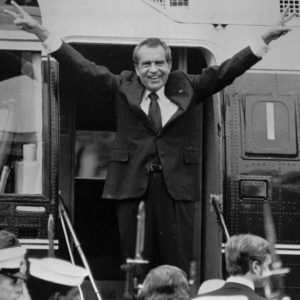Forty-three years ago, Richard Nixon, facing certain impeachment, resigned the presidency. As Gerald Ford assumed the office later that same day, Ford remarked to the American people that “our long national nightmare is over.”
That was true in the immediate sense for all of the reasons Ford gave: “Our Constitution works; our great Republic is a government of laws and not of men. Here the people rule.”
It was also true for reasons better left unspoken that day. Richard Nixon was a complicated, flawed man who had done any number of things he should not have, and the nation was stronger for his absence from the national stage. Ford would pardon Nixon a little less than a month later, seemingly putting an end to the entire affair.
But in the longer arc of history, our national nightmare was most certainly not over. In many ways, it was only just beginning. The events surrounding the Watergate affair gave birth to a new political reality that saw long-established relationships and expectations upended. America had, irrevocably, lost its innocence.
The press provided the first indication that things would never be the same again. Bob Woodward and Carl Bernstein untangled the mess that was Watergate, but their fellow members of the Fourth Estate drew the wrong lessons. Post-Nixon, the press became increasingly predatory and left-leaning. This continued until the rise of talk radio, Fox News, and their ilk. And even then, the press never returned even to a semblance of impartial reporting. It merely doubled down on the error of leaning hard to the left by spawning a doppelganger that leaned hard to the right.
Journalistic partisanship is nothing new in the United States, of course, but the lofty pretense toward objectivity hasn’t passed the smell test for some time. Coupled with an urge to destroy political opponents regardless of the merits of doing so, partisanship among the press yields a dangerous mix of ideology and power, so much so that when many people hear the term “fake news,” they accept it without question. The press has most certainly brought this on itself.
Lying politicians are nothing new in the United States either. The political class has never been wholly, or even mostly, composed of saints. But in the wake of Watergate, the American people have come to believe that there is simply no such thing as an honest politician. From Ronald Reagan’s providing covert military aid to the Nicaraguan Contras after Congress had banned such support, to Hillary Clinton’s mishandling classified communications and then lying to Congress about what she had done, voters have become inured to politicians’ lies — so much so that they routinely overlook scandals that would have made Nixon blush.
Worse yet, those same voters have come to believe that every important political event is tinged by some sort of grand conspiracy, over which they can have no control. They simply expect the worst from their elected leaders. As a result, Americans have become nothing short of infantilized in the face of the ruling class. They regard politics as another sort of sport, picking their favorite team and defending it – not out of a sense of principle but out of a misguided sense loyalty. More often than not, all that matters is winning. What happens after the election is relatively unimportant so long as the other group is kept out of power.
The worst thing about the loss of American innocence, though, is that the people have become increasingly unable to imagine what it means to be their best. It is one thing to engage in sloganeering like “Make America Great Again,” or even “Stronger Together.” It is quite another to recur to first principles like “Life, Liberty, and the Pursuit of Happiness.” And with the intervening variable of Nixon’s resignation and all it entails, it seems impossible to get back home.
Gerald Ford was right. Our Constitution works. But it works a lot better when we see things for what they are. Our long national nightmare is not yet over, and it won’t be until we demand better from our politicians and the press. And the first step in demanding better of them is to demand better of ourselves.

